EU VAT Place of Supply Rules for Services: B2B & B2C Compliance Guide

Services, which include many sectors and industries, such as transport, telecommunications, and professional services, account for nearly 75% of GDP and employment in the EU market. According to data provided on Access2Markets, the EU is the world's largest importer and exporter of services, with about 25% of world trade.
Therefore, taxability rules and regulations for the supply of services, including the place of supply rules, play a vital role in ensuring the revenue from providing services is distributed appropriately and determining where and who should charge and remit VAT.
The EU's place of supply rules for services vary depending on who receives the service: individual consumers or businesses. In addition to general rules for place of supply, the EU regulatory framework includes several exemptions or special rules for specified services. Understanding these principles is essential for complying with EU VAT laws and avoiding penalties related to the inaccurate application of VAT rules.
General Rules for B2B and B2C Supply of Services
The EU VAT Directive, as the most relevant EU law for defining the place of supply rules for services, provides two general place of supply rules.
B2B Supply of Services
Suppose the buyer or recipient of the services is another business. In that case, if the transaction in question is business-to-business (B2B), the place of supply is where the buyer or recipient is established, regardless of whether it is in the EU or outside of the EU. This means that the businesses receiving the service are responsible for paying VAT on the service received.
The location of the business receiving services is determined by the place of establishment, fixed establishment, or where the business has a permanent address or usual residence. Suppose a German company provides consulting services to a business in France. In that case, the place of supply is France, and the receiving company must account for VAT under the reverse charge mechanism.
B2C Supply of Services
When the buyer or recipient of service is an individual consumer, the place of supply is where the supplier or provider of service is established, has a fixed establishment, or has a permanent address or usual residence.
Therefore, the supplier is responsible for charging and remitting VAT according to the rules of the country of establishment. For example, Spanish VAT applies if a Spanish company provides advisory services to an individual in Italy.
Special Rules for Specific Services
Usually, where there are general rules, there are exceptions to those rules, in this case, special rules for certain types of services. Some exceptions are defined for providing certain services, such as services connected with immovable property and transportation services. There are also special rules for some other types of services, but this article will cover two previously mentioned.
Service Connected to Immovable Property
Services related to immovable properties, including those provided by real estate agents, experts, and other professionals involved in planning and coordinating construction projects, such as architects and on-site supervisors, are subject to VAT in the country where the property is located.
Immovable property includes land and any building or other fixed attachments to land, such as walls, fences, and pipeline systems for gas, water, and sewage.
A service is considered directly connected to a property if it depends on the property itself, such as renting out or managing it, or when it is meant to change the property in some way, legally or physically, like handling ownership paperwork or renovation work.
These rules apply regardless of whether the services are provided to businesses (B2B) or individual consumers (B2C).
Transport Services
For B2B and B2C passenger transport services, the place of supply is where the transport takes place, proportionate to the distance covered. For example, if the bus ride goes from Italy through Slovenia to Croatia, the price of a bus ticket will be proportionate to the distances traveled in each country.
Suppose an individual customer hires a transport company to transport some goods within an EU country, such as B2C transport. In that case, the transport company must charge the VAT of the country where the transport is provided. For example, if the individual hires a company to transport goods from Berlin to Munich, the German VAT is applied, regardless of whether the transportation company is Austrian, Polish, or German.
For B2C intra-EU transportation of goods, when an individual customer hires a transportation company to transport goods from one EU country to another, the place of supply is the place of departure. This means that if goods are transported from Slovakia to Hungary, Slovak VAT applies, regardless of whether the customer or the company hired is located or established in Slovakia or another country.
However, if the company is hired by another company to transport goods intra-EU, the customer is established in the place of supply.
Place of Supply for Digital Services
In today's highly digitalized world, with the establishment and rise of the digital economy, it is vital to determine where digital services are taxed and subject to VAT. To determine the supply of digital services, it is necessary to determine who the customer is, individual consumers or businesses.
Services supplied over the Internet or other digital networks, where human input is nonexistent or minimal, are considered digital services. Under the EU VAT legislation, the supply of digital services includes software, hosting services, images, text, music, films, games, and remote teaching.
B2C Supply of Digital Services
The 2021 VAT reform established the EUR 10,000 threshold for B2C supply. Therefore, if the digital service suppliers exceed the EU-wide threshold, they must apply the VAT rules of the EU country where the consumer is located. On the contrary, if the annual turnover from digital services is below EUR 10,000, suppliers may apply VAT rates defined in the country where they are established.
B2B Supply of Digital Services
The place of supply rules for B2B transactions is more straightforward since the general rules for B2B supply apply. Therefore, for the B2B supply of digital services, the place of supply is where the company receiving or buying the service is established.
Conclusion
Respecting EU VAT rules relating to the supply of services is essential for all individuals and businesses that provide these services, particularly for cross-border transactions. As this article explains, the place where the transaction is taxable depends on the buyer or recipient of the services and the service provided. Although general rules for the place of supply apply to most services, there are notable exceptions.
All taxable persons should understand which rules apply to their services and ensure they are updated on any changes. One recent change is the introduction of a new EU-wide for virtual events, such as cultural, artistic, scientific, educational, and entertainment, where the place of supply for B2C transactions is the country where the consumer is located.
Source: EU VAT Directive, European Commission - Explanatory notes on EU VAT place of supply rules on services connected with immovable property, Irish Tax and Customs - Revenue, Taxation and Customs Union - Where to tax?, VATabout

More News from Europe
Get real-time updates and developments from around the world, keeping you informed and prepared.
-e9lcpxl5nq.webp)







-3rcczziozt.webp)

-rvskhoqpms.webp)




-a5mkrjbira.webp)

-ivkzc1pwr4.webp)




-hssrwb5osg.webp)



-c06xa1wopr.webp)









-webajrr4ny.webp)
-evibmwdwcn.webp)
-7acdre0hop.webp)

-lcgcyghaer.webp)
-ol6mdkdowg.webp)
-aqdwtmzhkd.webp)

-njgdvdxe2u.webp)



-i6rki3jbad.webp)
-hdwgtama05.webp)

-atbhy5fyxv.webp)






-zp2n6zixoa.webp)
-oa1ynbm4sn.webp)


-lltkno6txy.webp)



-do38odrqnq.webp)

-t409oldqzt.webp)

-hordopb6xh.webp)

-ooimnrbete.webp)

-lwb5qpsily.webp)


-eumafizrhm.webp)

-mtqp3va9gb.webp)

-3ewrn1yvfa.webp)
-591j35flz2.webp)

-huj3cam1de.webp)


-hafis0ii23.webp)

-qseaw5zmcy.webp)



-qzsah2ifqx.webp)


-69rzooghib.webp)
-wrvng98m0g.webp)


-psucycuxh2.webp)
-klyo8bn5lc.webp)




-6wv5h5eyyd.webp)
-tfgg78rbid.webp)
-a6jpv9ny8v.webp)
-qhdbapy0qr.webp)


-owvu7zoc13.webp)


-h28jrh1ukm.webp)

-wl9bl1rw3a.webp)

-2w76jtvtuk.webp)

-c0uvrmrq9j.webp)



-pofe7ucwz3.webp)



-5cc23ezxyf.webp)
-rrmabbekeb.webp)








-iyyeiabtaf.webp)
-c8rbjkcs01.webp)
-nilkffjhah.webp)

-hikakq55ae.webp)

-z1d60bldtg.webp)
-d1a0q6n7mp.webp)
-viip8nvoeh.webp)
-bvv1otliox.webp)



-de8hdb1bn3.webp)
-7xsxxoypnx.webp)

-cm0opezg73.webp)
-0tovsdupmi.webp)
-subxdamdj6.webp)


-gly6ablwnh.webp)
-gkduqhwbzh.webp)
-qpe1ld9vcj.webp)
-8noukwsmba.webp)
-aka29tuhkt.webp)


-fisvs27yrp.webp)


-mp0jakanyb.webp)

-aivzsuryuq.webp)



-o7f4ogsy06.webp)

-zjja92wdje.webp)
-hrbhdts8ry.webp)
-qtdkwpgkug.webp)


-cf8ccgah0p.webp)
-0em3cif5s6.webp)






-ptzesl0kij.webp)

-tfzv42pyms.webp)







-uodv7sfbih.webp)
-bbrdfmm9qf.webp)



-m2tl8crfqr.webp)




-1awbqjgpjs.webp)
-avbjsn1k1g.webp)


-0h8ohkx6s0.webp)



-wfmqhtc7i6.webp)
-7wljbof2zo.webp)

-eqt97uyekl.webp)
-wzw9mcf563.webp)

-z4oxr6i0zd.webp)




-l0zcrrzvhb.webp)
-fhtic1pwml.webp)

-iipdguuz9p.webp)
-nkhhwrnggm.webp)
-pltqwerr3w.webp)

-nn6mtfbneq.webp)

-tmnklelfku.webp)



-8z1msbdibu.webp)
-7g16lgggrv.webp)



-lxcwgtzitc.webp)
-9mc55kqwtx.webp)


-xla7j3cxwz.webp)
-jrdryw2eil.webp)






-t9qr49xs2u.webp)


-qjopq5jplv.webp)



-vune1zdqex.webp)

-qsozqjwle2.webp)
-rgjta7iwiv.webp)

-zb6bxxws47.webp)
-lyfjzw4okp.webp)

-ogpfmol5m1.png)


-czisebympl.png)

-zetvivc79v.png)
-ud7ylvkade.png)
-qizq6w2v5z.png)






-ihr6b4mpo1.webp)
-k1j4au0ph6.webp)
-swxxcatugi.webp)


-ig9tutqopw.webp)

-tauoa6ziym.webp)

-spr0wydvvg.webp)

-xfuognajem.webp)





-u2nv5luoqc.webp)








-opuxpan2iu.webp)




-kwttsfd8ow.webp)
-8u14qi10nj.webp)

-wjpr96aq5g.webp)

.png)

.png)


.png)


.png)



.png)
.png)
.png)
.png)
.png)

.png)
.png)




.png)
.png)




































































































































